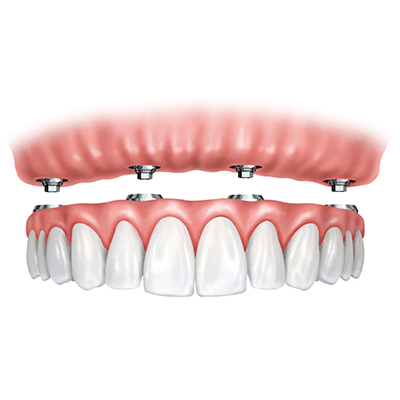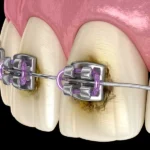Mini Dental Implants for Dentures

Are you considering mini dental implants? Do you have traditional dentures or have experienced significant tooth loss to the extent that you’re wondering if being fitted for dentures is the right path forward for you? If so, you may be interested to know that today’s dental patients have alternatives to dentures that simply fit along the gum line. At Omega Dental Specialists in Houston, Texas, we offer mini dental implants for dentures that many of our patients find that they highly prefer over regular dentures. Please read on for more information, and if you have any questions, feel free to contact our well-trained staff for answers.
Table of Contents
Mini Dental Implants Designed for Those With Dentures
Dentures have long been a lifesaver for those who have lost functionality as the result of losing teeth. They allow them to chew and speak as well as help retain facial structure. However, as anyone who’s ever worn dentures already knows, they’re far from ideal. They’re known to slip and even fall out, usually at the worst possible moments, such as when you’re eating, having a conversation, or both. Few things are more embarrassing than having dentures fall out while dining with friends or family, yet many denture wearers have had this exact experience. Fortunately, advances in technology have created options such as mini dental implants for dentures that minimize the chances of this scenario happening. Here’s what you need to know:

What Are Mini Dental Implants?
Dental implants are surgical components made with lightweight titanium designed to play the same role as tooth roots for the purpose of holding bridges and crowns in place. They are also used in patients with dentures to provide dentures with the same level of stability as a healthy set of natural teeth. Typically smaller in size than standard dental implants, these are placed in the lower jaw area and then affixed to the dentures. Traditional implants have small screws in the ends that stick up from the bone and gum tissues that are screwed onto individual artificial teeth, but those used for dentures have small ball bearings instead of screws. The dentures are secured with 0-rings that can be easily taken off by the dentist during routine cleaning sessions and by the patient during oral hygiene sessions at home.
How Are Mini Implants Installed?
Mini dental implants are installed using a procedure very similar to the installation of their conventional counterparts, although it’s far less time-consuming and not as invasive. The procedure is performed on an outpatient basis and involves numbing the area with a local anesthesia before making tiny incisions. Your dentist will then drill small holes into the bone tissue of your jaw where the implants will be installed. After the posts are situated in these holes, your dentist will close up the area with sutures afterward.
In most cases, your dentist will be able to stabilize the dentures on the same day. You will likely experience a degree of discomfort and may need to take an over-the-counter pain reliever for the first day or so after the procedure is performed. Your dentist will provide you with a list of foods and beverages to avoid during the short healing process as well as advice on what to eat and drink and what to avoid on a long-term basis.
Putting in and Taking Out Your Dentures
Your dentures will still need to be taken out and cleaned on a regular basis. With dentures that are secured using implant posts, all you need to do is snap them in or out of place by applying an equal amount of gentle pressure on the teeth on either side of the O-ring. It may take several practice sessions to get it down, but after that, you’ll probably find it very easy to take your dentures out and put them back in.
Caring for Your Mini Dental Implants
Practicing good oral hygiene is an important part of getting the most from your dentures, and this includes caring for the implants in the right way. After you take your dentures out to clean them, you should brush the posts in the same manner that you would use for natural teeth. Posts can collect bacterial buildup and plaque, which can lead to the development of gum disease if allowed to continue unchecked. Take special care to clean thoroughly around the O-ring fixture and around the balls at the base of the posts. After you’ve completed brushing, rinse your mouth with an antibacterial mouthwash for optimal protection.
Mini Dental Implants vs Traditional Dental Implants
The major differences between mini dental implants for dentures and their traditional counterparts include their size and basic overall function and durability. Traditional implants are comprised of two separate pieces that are 3. to 3.25 millimeters in diameter, while mini implants for dentures are only made up of one piece this is less than 3 millimeters in diameter — they are often half the size of traditional dental implants. They are sometimes referred to as small-diameter implants or narrow-diameter implants due to their smaller size. Mini implants also don’t go as far into the bone tissue as regular implants, making them a good option for those who’ve experienced bone loss in the jaw region.
Mini Implants Pros and Cons
Mini implants are excellent solutions for some patients but may not be the best choice for others. Only a skilled dentist with significant experience in implant technology can decide if mini implants are right for you. Following are some of their pros and cons.
Advantages of Mini Dental Implants
The main advantage of mini dental implants is that they provide enhanced stability for dentures. You’ll be able to chew your food better, your speech will be clearer, and, as mentioned previously, they require less bone tissue material than regular implants. Other advantages of mini implants include:
- They can be custom-made to fit your existing dentures
- They are easier to clean than regular implants
- They provide a firmer fit for your dentures
- They don’t require bonding agents or adhesives
- The results are permanent
- They are less expensive than regular implants
- The overall procedure is less invasive
Disadvantages of Mini Dental Implants
Because mini implants are smaller than traditional implants, they come with a different weight-distribution dynamic that may result in healing times being a little longer. They may also put a slightly higher amount of stress on the bone material in which they’re implanted. Other potential disadvantages include:
- They may provide less chewing force than regular implants
- The O-rings will have to be replaced on a regular basis
- The implants may come loose if you clench or grind your teeth on a regular basis
How Long Do Mini Dental Implants Last?
The lifespan of mini dental implants depends on a variety of factors. How well the implants are cared for often plays a role in determining the extent that they last. Those who smoke and consume alcohol on a regular basis may be shortening the life of their implants, as well as those who have nervous habits such as chewing on pencils, fingernails, or ice. The overall health of the patients also affects the longevity of the implants.
The best way to ensure that your implants last as long as possible is to practice good oral hygiene, avoid chewing on hard or sticky objects, and scheduling a visit with your dentist every six months. Your dentist will be able to identify any emerging issues with the potential to interfere with your implants and recommend preventive measures.
Do Mini Implants Work on Front Teeth
Although mini implants are most commonly used for the purpose of securing dentures and providing them with stability, they are also a good option for replacing missing front teeth. They are also used for single tooth implants in Houston in cases where the area where a tooth is missing is narrow.
Where Can You Get Mini Dental Implants?
You should always make sure that you see an implant expert if you are interested in exploring your options.
Omega Dental Specialists in Houston, Texas
At Omega Dental Specialists in Houston, our skilled team of experts specializes in multiples aspects of advanced modern dentistry. We use state-of-the-art dental technology to make sure that each patient receives the best possible results from our treatments. We’re conveniently located in midtown Houston and extend our commitment to customer convenience by being open seven days per week.
How Much Do Implants Cost?
The overall cost of full mouth dental implants in Houston depends on many different factors. The average cost of one tooth is anywhere from $1,000 to $3,000, but this doesn’t necessarily mean that you’ll pay a proportionate amount for full mouth implants. We’ve got a dental implants cost breakdown on our site designed to help patients get a rough idea of what they may end up paying for the procedure. We accept most kinds of insurance as well as offer payment plans.
Please don’t hesitate to reach out to us at your convenience for more information on implants or other dental issues. Unlike most dental practices, our initial consultations are entirely free.





